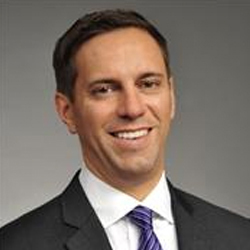

In April, distinguished actuary Greg Leonberger gave a talk to undergraduates titled, “From Liabilities to Assets: The Benefits of an Actuarial Background.” The lecture was part of the Delahanty Family Endowment for Excellence in Mathematics lecture series.
Leonberger received a bachelor’s in mathematics and economics from Notre Dame and later earned an MBA from the University of Chicago. He has experience working as both a pension consultant and investment consultant, and is currently the Director of Research and a managing partner at Marquette Associates.
In his lecture, Leonberger advised students on the advantages of an actuarial education and the career prospects available to certified actuaries. He used examples from his own career to demonstrate both traditional and nontraditional roles actuaries can play in business, and encouraged students to ask their own questions about the field.
In explaining the advantages of an actuarial background, Leonberger emphasized the impressive qualifications actuaries earn. “Once you’ve gotten through the actuarial exams you have a foundation that’s pretty unrivaled in terms of a business quantitative background,” Leonberger said. “It’s going to give you a big leg up in your career.”
Leonberger used his own experience working as a pension consultant at Hewitt Associates to exemplify the traditional career of an actuary. “Pension consulting is one of a number of different avenues you can pursue in traditional actuarial jobs,” Leonberger said. “The deal is pretty much the same: you get a number of paid hours off to study, there are a lot of other actuarial students coming into the same position, you’re going to go through the exams and work on a lot of different projects. It’s a great background to have.”
Leonberger also has extensive experience in investment consulting, which he termed a “nontraditional” actuarial job. Leonberger gave several examples of projects he has worked on and engaged students in examining actual data from these cases.
Throughout the lecture students asked questions about the value of consulting versus actuarial firms, the future of various actuarial fields, and for financial advice on the best ways to invest money. Other questions focused more specifically on actuarial work, like how to advise clients in a market that could swing drastically.
“A lot of the time you’re just guiding your clients to make responsible decisions,” Leonberger answered. “Our job is to keep our clients on an even keel. Cool heads prevail in most environments.”
When asked what he believed helped him stand out in the financial job market, Leonberger cited his actuary and MBA credentials, a good network, a little bit of luck, and lots of hard work.
“The amount of work you put into your career and how badly you want it can really take you places,” Leonberger said. “If you want it, go after it.”